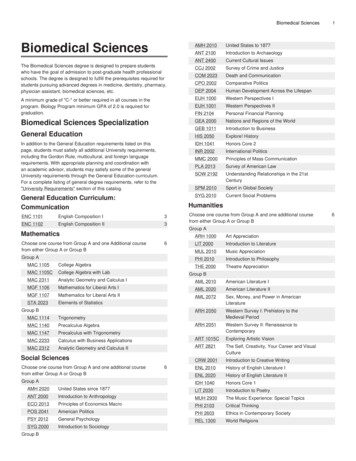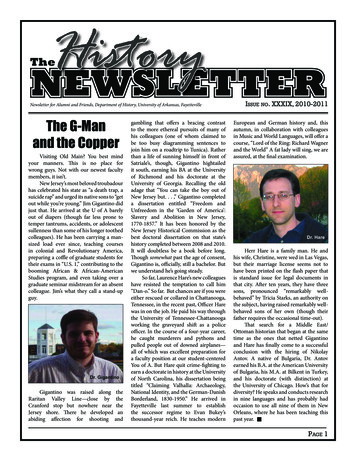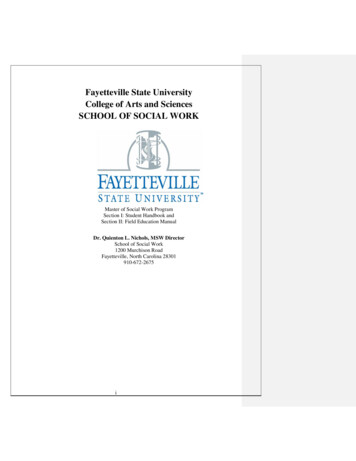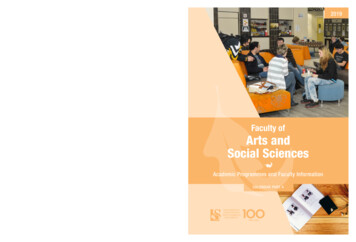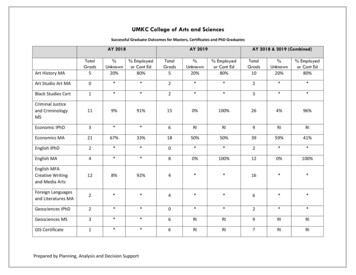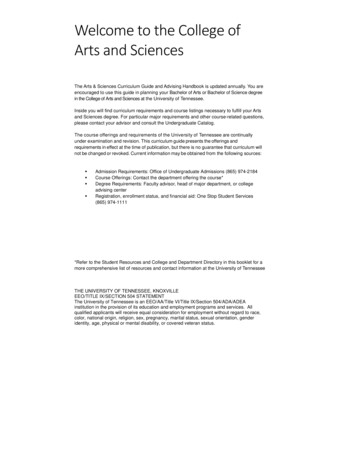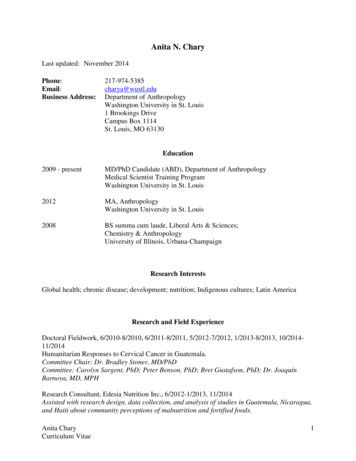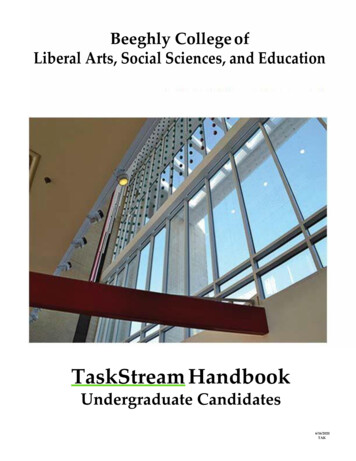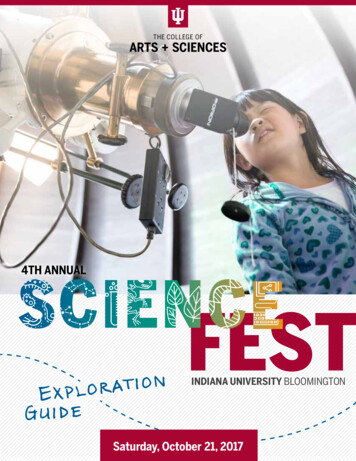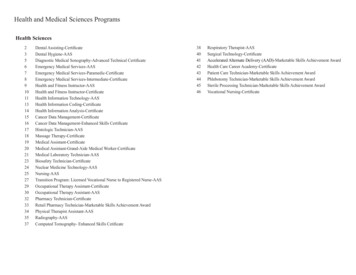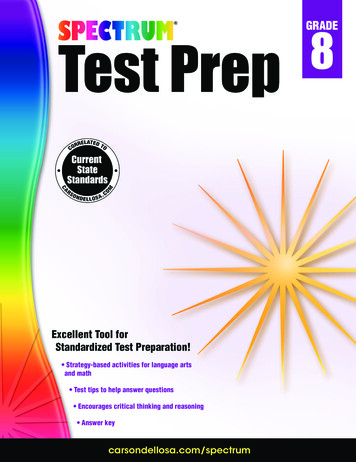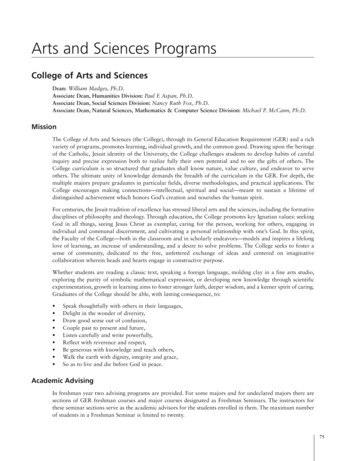
Transcription
Arts and Sciences ProgramsCollege of Arts and SciencesDean: William Madges, Ph.D.Associate Dean, Humanities Division: Paul F. Aspan, Ph.D.Associate Dean, Social Sciences Division: Nancy Ruth Fox, Ph.D.Associate Dean, Natural Sciences, Mathematics & Computer Science Division: Michael P. McCann, Ph.D.MissionThe College of Arts and Sciences (the College), through its General Education Requirement (GER) and a richvariety of programs, promotes learning, individual growth, and the common good. Drawing upon the heritageof the Catholic, Jesuit identity of the University, the College challenges students to develop habits of carefulinquiry and precise expression both to realize fully their own potential and to see the gifts of others. TheCollege curriculum is so structured that graduates shall know nature, value culture, and endeavor to serveothers. The ultimate unity of knowledge demands the breadth of the curriculum in the GER. For depth, themultiple majors prepare graduates in particular fields, diverse methodologies, and practical applications. TheCollege encourages making connections—intellectual, spiritual and social—meant to sustain a lifetime ofdistinguished achievement which honors God’s creation and nourishes the human spirit.For centuries, the Jesuit tradition of excellence has stressed liberal arts and the sciences, including the formativedisciplines of philosophy and theology. Through education, the College promotes key Ignatian values: seekingGod in all things, seeing Jesus Christ as exemplar, caring for the person, working for others, engaging inindividual and communal discernment, and cultivating a personal relationship with one’s God. In this spirit,the Faculty of the College—both in the classroom and in scholarly endeavors—models and inspires a lifelonglove of learning, an increase of understanding, and a desire to solve problems. The College seeks to foster asense of community, dedicated to the free, unfettered exchange of ideas and centered on imaginativecollaboration wherein heads and hearts engage in constructive purpose.Whether students are reading a classic text, speaking a foreign language, molding clay in a fine arts studio,exploring the purity of symbolic mathematical expression, or developing new knowledge through scientificexperimentation, growth in learning aims to foster stronger faith, deeper wisdom, and a keener spirit of caring.Graduates of the College should be able, with lasting consequence, to: Speak thoughtfully with others in their languages,Delight in the wonder of diversity,Draw good sense out of confusion,Couple past to present and future,Listen carefully and write powerfully,Reflect with reverence and respect,Be generous with knowledge and teach others,Walk the earth with dignity, integrity and grace,So as to live and die before God in peace.Academic AdvisingIn freshman year two advising programs are provided. For some majors and for undeclared majors there aresections of GER freshman courses and major courses designated as Freshman Seminars. The instructors forthese seminar sections serve as the academic advisors for the students enrolled in them. The maximum numberof students in a Freshman Seminar is limited to twenty.75
Arts and Sciences ProgramsThe second advising program is provided for all other freshmen not enrolled in a Freshman Seminar. Academicadvisors for these freshmen will be faculty members of the department in which the freshmen have chosen tomajor.All students in the sophomore, junior and senior years are assigned faculty advisors by the chair of thedepartment in which they have their major. All freshmen enrolled in the College of Arts and Science arerequired to meet with their academic advisor at least twice in each semester: first, to obtain a copy of theirmidterm grades and second, shortly before pre-registration time for the coming semester. During this secondmeeting freshmen are to discuss with their academic advisor the courses to be selected for the coming semester.After this discussion the advisor will give the advisee a personal identification number to be used for preregistration on-line. Freshmen are encouraged to meet with their academic advisor as often as they haveconcerns, academic or personal, that need to be addressed.Major ConcentrationsThe following majors are offered in the College of Arts and Sciences (Where the name of the major is notpart of the name of the department, the department is indicated in parentheses):Bachelor of ArtsArt Education, Economics, English, European Studies (Foreign Languages and Literatures), Fine andPerforming Arts, French (Foreign Languages and Literatures), French Studies (Foreign Languages andLiteratures), German (Foreign Languages and Literatures), History, International Relations (PoliticalScience), Italian (Foreign Languages and Literatures), Latin (Foreign Languages and Literatures),Philosophy, Political Science, Spanish (Foreign Languages and Literatures), and TheologyBachelor of ScienceActuarial Science, Biology, Chemical Biology, Chemistry, Criminal Justice (Sociology), Computer Science,Elementary, Elementary Education, Special Education, Environmental Science (Chemistry),Interdisciplinary Health Services (Health Services), Mathematics, Physics, Psychology, and SociologyInterdisciplinary ProgramsStudents may obtain a minor or certificate in the following interdisciplinary programs: Aerospace Studies,Africana Studies, American Studies, Ancient Studies, Asian Studies, Classics, Environmental Science, EuropeanStudies, Faith-Justice Studies, Gender Studies, Interdisciplinary Health Care Ethics, International Relations,Latin American Studies, Medieval, Renaissance and Reformation Studies.Five Year Combined Bachelors/masters ProgramsThe following programs offer the option of a five year combined bachelors/masters degree: B.S. inChemistry/M.S. in Education; B.S./M.S. in Education with Certifications in Elementary Education, SpecialEducation and Reading; Fifth Year M.A. in Writing Studies; B.S. in Environmental Science/ M.S. in Education;B.S. in Mathematics/M.S. in Secondary Mathematics Education; B.S. in Physics/M.S. in Education; B.S./M.S.in Psychology.76
Actuarial ScienceActuarial ScienceActing Director: LurieActuarial Science Advisory Board: Bobo, DeLiberato, Klimberg, Liebman, SchellhornProgram OverviewThe Actuarial Science major seeks to build upon the Jesuit tradition of excellence, as embodied in the GER, bygiving students a strong analytical foundation with which to solve the problems encountered in themanagement of risk. The Actuarial Science major recognizes that success in the actuarial profession derivesfrom the confluence of insightful business perspectives, rigorous analytical reasoning and a love of learning.The Actuarial Science major bridges the traditional distinction at Saint Joseph’s between the Haub School ofBusiness and the College of Arts and Sciences. To be a successful actuary, a strong business backgroundutilizing Finance and Decision & System Sciences courses in the Haub School of Business must be combinedwith the analytical skills developed in mathematics and economics courses found in the College of Arts andSciences. The Actuarial Science major is, of necessity, an inter-college and interdisciplinary program. Theactuarial profession stresses the ‘love of learning’ component not only in word, but also in deed. Actuariescontinue to learn throughout their careers and take great pride in passing the strenuous exams their professionrequires for certification. The combination of liberal arts Jesuit values with analytical problem solving skillswill uniquely position our graduates to assume leadership roles in the field of Actuarial Science.In addition to the benefits afforded by the Jesuit liberal arts tradition at Saint Joseph’s, the Actuarial Sciencemajor has three goals specific to the actuarial profession: First is to maintain a high level of analytical trainingwhile providing the business perspectives and love of learning necessary for success in the actuarial profession.Second is to prepare students to take the first two actuarial exams. Third is to make certain that students’performance in the three Validation by Educational Experience (VEE) areas is sufficient to receive VEE creditupon completion. Actuarial Science majors will thus be ideally poised to enter the actuarial profession.Requirements for the Actuarial Science MajorGER Common Courses (See Curricula): six coursesGER University Distribution (See Curricula): fourteen courses, includingMathematics:MAT 1351Calculus IMAT 1361Calculus IINatural Science:a 2-semester sequence of a laboratory scienceSocial/Behavioral Sciences:ECN 1011Introductory Economics (Micro) (VEE)ECN 1021Introductory Economics (Macro) (VEE)GER Electives: any five coursesMajor Concentration: fifteen courses, includingCSC 1401(or CSC 1421) Introduction to Computer ProgrammingMAT 1371Calculus IIIMAT 1591Fundamental Ideas of MathematicsMAT 1461Introduction to Linear AlgebraMAT 2211Mathematical ProbabilityMAT 2221Mathematical StatisticsMAT 2231Applied Statistical Methods I (VEE)FIN 1341Introduction to Finance (VEE)FIN 2401Intermediate Managerial Finance (VEE)77
Arts and Sciences oduction to InsuranceFinancial AccountingActuarial ProbabilityMathematics of FinanceDatabase ManagementOne elective chosen from MAT 1381, MAT 2011, MAT 2131, MAT 2461 orapproved by the Actuarial Science program directorSatisfactory completion of the Actuarial Science major automatically qualifies the student to apply for a minorin mathematics. Students are ready to take the first and second actuarial exams at the end of their junior andsenior years, respectively. Students are encouraged to participate in a summer internship during theirjunior/senior year. In the past, these internships have proven to be most valuable to students and theirsubsequent job search.M INORINA CTUARIAL S CIENCEAdvisor: CavaliereWith the approval of the Actuarial Science Director, students may minor in actuarial science. Students desiringto minor in actuarial science must take the following courses: ASCECN 1011 and ECN 1021 which satisfy the GER Social Sciences requirementMAT 1351 and MAT 1361 which satisfy the GER Mathematics requirementMAT 1371 or MAT 1391, MAT 2211, MAT 2221, ASC 2011, ACC 1011, FIN 13412011 Actuarial Probability3 creditsThis course provides an introduction to the basic probabilistic principles of insurance and RiskManagement. Selected topics are covered to enable the application of probability theory to solveproblems found in insurance and risk management applications. A problem solving approach will beadopted to provide preparation to pass the first actuarial exam co-sponsored by the Casualty ActuarialSociety (Part 1) and the Society of Actuaries (Part P). Prerequisite: MAT 2211.ASC2021 Financial Mathematics of Actuarial Science3 creditsThis course provides an in depth study of the theory of interest. Topics that will be covered include:calculation of the effective rates of interest and discount, evaluation of accumulated and present valuesof fixed and variable annuities, solution of interest problems involving unknown time periods and rates,determination of yield rates, amortization of loans and sinking funds, calculation of the price of a bond,and valuation of securities. This course will prepare students for the actuarial science examination infinancial mathematics which is co-sponsored by the Casualty Actuarial Society (Part 2) and the Societyof Actuaries (Part FM). Prerequisite: MAT 1371.78
Aerospace StudiesAerospace StudiesAir Force Reserve Officer Training Corps (AFROTC)Professor: Fournier (Chair)Assistant Professors: Lilley, Marchesini, MillerObjectivesThe AFROTC objectives are to: recruit, select, and retain officer candidates until they are commissioned as second lieutenants in the U.S.Air Force; provide college-level education that qualifies cadets for commissioning in the U.S. Air Force; and develop each cadet’s sense of personal integrity, honor, and individual responsibility; enhance knowledgeof how the U.S. Air Force serves the national interest; increase understanding of officer professionalism inthe U.S. Air Force; and develop potential as a leader and manager.ProgramThe Department of Aerospace Studies offers two-year, three-year, and four-year curricula leading to acommission as a Second Lieutenant in the Air Force. In the four-year curriculum, a student takes the GeneralMilitary Course (GMC) during the freshman and sophomore years, attends a four-week summer trainingprogram, and then takes the Professional Officer Course (POC) in the junior and senior years. A student isunder no contractual obligation to the Air Force until entering the POC or accepting an Air Force scholarship.In the three-year curriculum, a student attends a five-week summer training program and then enters the POCin the junior year. In the two-year curriculum, a student attends a five-week summer training programfollowing the spring semester of their junior year.The subject matter of the freshman and sophomore years is developed from a historical perspective and focuseson the scope, structure, and history of military power with the emphasis on the development of air power andits relationship to current events. During the junior and senior years the curriculum concentrates on theconcepts and practices of leadership and management, and the role of national security forces in contemporaryAmerican society.In addition to the academic portion of the curricula, each student participates in a two-hour LeadershipLaboratory each week. During this period the day-to-day skills and working environment of the Air Force arediscussed and explained. The Leadership Lab utilizes a student organization designed for the practice ofleadership and management techniques.Air Force ROTC offers scholarships for two, three, and four years on a competitive basis to qualifiedapplicants. All scholarships are applied to tuition and lab fees, and include a textbook allowance, plus a taxfree monthly stipend which varies from 300 to 500, depending on graduation date.Minor in Aerospace StudiesA minor in Aerospace Studies is available to any student completing the courses of study listed below. Studentsmust receive approval of the Professor of Aerospace Studies. Students desiring a minor in Aerospace Studiesmust declare this choice no later than the add/drop period of their seventh semester. Students successfullycompleting the following requirements will have a minor in Aerospace Studies transcribed on their studentrecord:AER2011-2021 Air Force Leadership StudiesAER2031-2041 National Security Affairs and Preparation for Active Duty79
Arts and Sciences ProgramsENGComposition-oriented courseUpper Level Foreign Language courseSpecific English and Foreign Language courses must receive approval by the Professor of Aerospace Studies toqualify.AER1011-1021 The Foundation of the United States Air Force2 creditsA survey course designed to introduce students to the United States Air Force and Air Force ReserveOfficer Training Corps. Featured topics include: mission and organization of the Air Force, officershipand professionalism, military customs and courtesies, Air Force officer opportunities, group leadershipproblems, and an introduction to communication skills. Leadership Laboratory is mandatory for AirForce ROTC cadets, and it complements this course by providing cadets with followership experiences.AER1031-1041 The Evolution of USAF Air and Space Power2 creditsA survey course designed to facilitate the transition from Air Force ROTC cadet to Air Force ROTCcandidate. Featured topics include: Air Force heritage, Air Force leaders, an introduction to ethics andvalues, introduction to leadership, group leadership problems, and continuing application ofcommunication skills. Leadership Laboratory is mandatory for Air Force ROTC cadets, and itcomplements this course by providing cadets with their first opportunity for applied leadershipexperiences discussed in class.AER2011-2021 Air Force Leadership Studies6 creditsThis course is a study of leadership and quality management fundamentals, professional knowledge, AirForce doctrine, leadership ethics, and communication skills required of an Air Force junior officer. Casestudies are used to examine Air Force leadership and management situations as a means ofdemonstrating and exercising practical application of the concepts being studied. A mandatoryLeadership Laboratory complements this course by providing advanced leadership experiences inofficer-type activities, giving students the opportunity to apply leadership and management principles ofthis course.AER2031-2041 National Security Affairs and Preparation for Active Duty6 creditsThis course examines the national security process, regional studies, advanced leadership ethics, AirForce doctrine. Special topics of interest focus on the military as a profession, officership, militaryjustice, civilian control of the military, preparation for active duty, and current issues affecting militaryprofessionalism. Within this structure, continued emphasis is given to refining communication skills. Amandatory Leadership Laboratory complements this course by providing advanced leadershipexperiences, giving students the opportunity to apply the leadership and management principles of thiscourse.80
American StudiesAmerican StudiesDirector: HysonThe minor in American Studies provides a framework within which students can focus their elective andrelated courses on the study of American history, literature, art, politics, ideas, and institutions. Studentsmajoring in economics, English, history, fine arts, political science, sociology, and theology are especiallyencouraged to consider a minor in American Studies. By examining the United States from a variety ofintellectual perspectives, American Studies minors will develop both a more nuanced understanding of thedevelopment and dynamics of American culture and a more sophisticated, interdisciplinary approach toacademic study.Participants must choose a minimum of six courses from those listed below, with at least two from each group:History 1275127612771278128112821Colonial AmericaAmerica in the Age of RevolutionsThe Civil War EraEthnic AmericaUrban AmericaProgressive Era to New DealPostwar America, 1945 to the PresentAmerican Ideas: From the Colonial Era to the Civil WarAmerican Ideas: From the Gilded Age to the PresentFoundations of American Foreign Policy, 1775-1914U.S. as a Global Power, 1914 to the PresentThe Civil Rights Movement in AmericaHistory of Women in America Since 1820American Environmental HistoryPopular Culture in the United StatesColloquium in American HistorySeminar in American HistoryEnglish rican Colonial and Federal LiteratureAmerican Romantic and Transcendental LiteratureAmerican Literature, 1865-1915Nineteenth Century American FictionAmerican PoetryAmerican DramaAmerican AuthorsTwentieth Century American NovelSouthern LiteratureContemporary American LiteratureNature Writing in AmericaContemporary American PoetryLiterature and CultureGeneral Group:ART 1041ART 2061ART 2571Experience of ArchitectureAmerican Art and ArchitectureAmerican Music81
Arts and Sciences 21223122412251228125412571238123912601American TheatreUnited States Economic HistoryAmerica: Myths, Images, RealitiesPhiladelphia: In Black and WhitePhilosophy of Cornel WestPhilosophy of Martin Luther KingAmerican PhilosophyAmerican Political ThoughtPublic PolicyCongress and the Legislative ProcessThe Presidenc
Aug 09, 2017 · The following programs offer the option of a five year combined bachelors/masters degree: B.S. in Chemistry/M.S. in Education; B.S./M.S. in Educa
